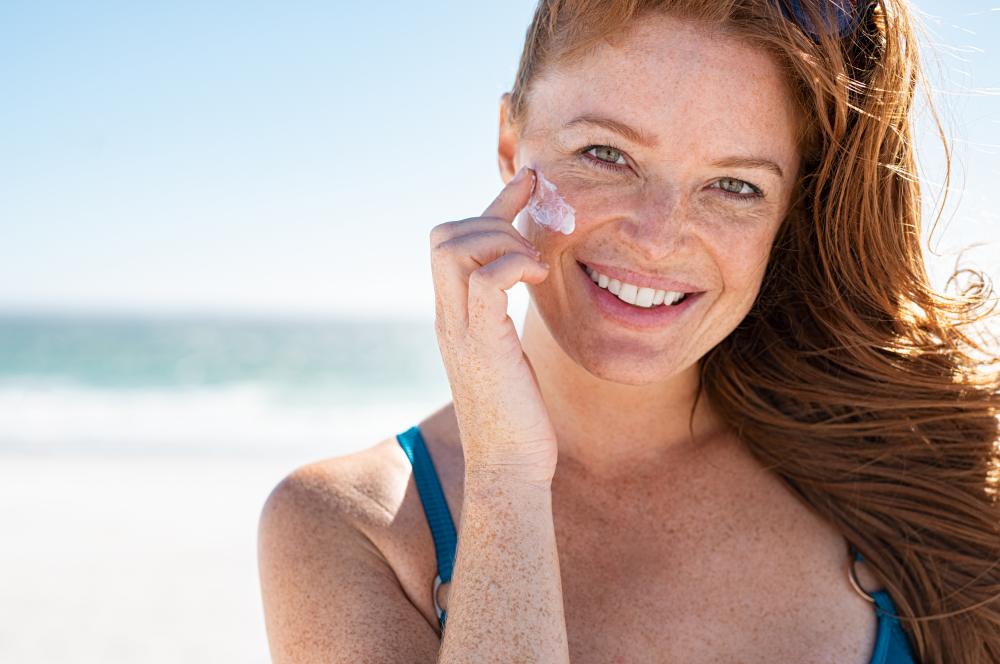No matter how well or routinely driven some people are, they still end up struggling with sunscreens.
What to choose and how to use are some common questions amongst most people. As whatever mainstream solution one picks, ends up with irritated saffy white skin.
But when your derma recommends mineral sunscreens but your favorite influencer says the contrary, who do you trust?
Today, we’ll discuss Mineral Sunscreens and if they are really good as your primary sun protection.
Are Mineral Sunscreens Really Good?
As the name suggests, mineral sunscreen is a solution that is composed of natural minerals like zinc oxide & titanium oxide.
Unlike chemical sunscreens, mineral sunscreens offer complete protection from all types of UV radiations by acting as tiny mirrors and reflecting all the rays.
How Does Mineral Sunscreens Work?
Wondering what makes it so good? Mineral sunscreens work through physical blocking rather than chemical absorption. When UV rays hit the mineral particles on your skin, they bounce off like light reflecting from a mirror. This creates an immediate protective barrier that doesn’t require waiting time to become effective.
Two active ingredients:
Zinc Oxide: ZnO is what brings the all-cover protection from UVA, UVB & UVC rays. Though UVC doesn’t really pass on the ozone but Zinc Oxide brings the broad spectrum of protection.
Vizor produces the highest SPF Zinc Oxide in the world and is perfect for formulating best & safest sunscreens.
Titanium Oxide: Unlike Zinc Oxide, this does not promise UVA protection but brings good UVB protection.
Mineral Sunscreens VS Chemical Sunscreens
Mineral (aka Physical) Sunscreens are often compared to chemical sunscreens and most influencers promote chemical based sunscreens for their personal agenda.
Chemical sunscreens work completely contrary to physical ones, so, instead of reflecting the rays, these absorb it and release it as heat energy. With ingredients like avobenzone, octinoxate, chemical sunscreens fail to offer complete protection as offered by physical sunscreen solutions.
Here are some key differences:
-
- Activation time: Mineral works immediately; chemical needs 15-20 minutes
- Protection method: Physical blocking vs. chemical absorption
- Skin sensitivity: Mineral generally better for sensitive skin
- Environmental impact: Mineral typically more reef-safe
Perks Of Mineral Sunscreens
There are so many benefits of using mineral based sunscreens but all of it lacks awareness.
Here are all the benefits of using Mineral sunscreens:
-
- No Wait Time: Unlike chemical sunscreens, the physical ones do not have a waiting period and provide instant protection.
- Soft: Physical sunscreens do not get absorbed by the skin and are gentle on even sensitive skin.
- Broad Protection: Mineral sunscreens protect the skin from all type of UV rays including UVA & UVB.
- Long Lasting: Mineral ingredients don’t break down in sunlight as quickly as some chemical filters, maintaining their effectiveness longer.
Are there any drawbacks to Mineral Sunscreens?
There’s a con to everything, even the nicest thing you could think of but it only matters if it affects. Here are some drawbacks to using mineral sunscreens:
White Casting Issue: Traditional mineral sunscreens can leave a visible white residue on the skin, especially on darker skin tones. However, newer formulations with micronized particles have significantly reduced this issue.
Texture: Unlike chemical solutions, the mineral sunscreens have thick texture which can be an issue to people who wish to have a lighter skin.
Except these, there’s no drawback of using mineral sunscreen and in the end, it all becomes a matter of what you prioritize.
How to Choose a Good Mineral Sunscreen?
Already there are companies who have started their ZnO powered campaigns but in reality, they are chemical solutions only with very little component of minerals.
Here are all the factors to consider while choosing a mineral sunscreen:
SPF Level: Make sure whatever you pick is above 30+ SPF and if you’re an athlete or do outdoor activities go for 50+ SPF.
Check Ingredients: It is important to check ingredients and their amount at the back of the bottle. Make sure there is Zinc Oxide & titanium oxide present in it.
Formulation: It is difficult to pick what to choose for one’s skin type as all skin types are different, so here’s a quick brief to help you find:
-
- Creams: Best for dry skin
- Lotions: Good for normal skin
- Sticks: Convenient for targeted application
- Tinted versions: Help minimize white cast
All Myths About Mineral Sunscreens (Debunked)
There are multi-million-dollar markets and all the giants are trying their best to fool people with fake myths all over the internet.
- Mineral Sunscreens are only for people with sensitive skin – this is one of the most common myths out there and is absolutely false as physical sunscreens can be used by everyone.
- Mineral sunscreens don’t work as well as chemical ones – Another false claim, it has been scientifically proven that mineral based sunscreens provide a broader spectrum of protection compared to the chemical ones.
- Makeup is not possible over mineral sunscreen – Even an amateur can apply makeup over a mineral solution, it is for people with absolutely no knowledge who fail to do so.
Final Words
To sum it all up shortly, mineral sunscreens are genuinely the best solution to protect your skin from premature aging, tanning and any other harmful effects caused by UV radiations.
And I hope that answers the question really well, but if you have any doubts or questions about anything that we discussed, feel free to share it via email or drop a comment below.
Do you need some strategies to help you make self-care a priority?
Snag a free workbook and get inspiration on all the ways to love your life even more.
>>Click Here to Discover Additional Articles on Strategies to Get Your Life on Track <<









